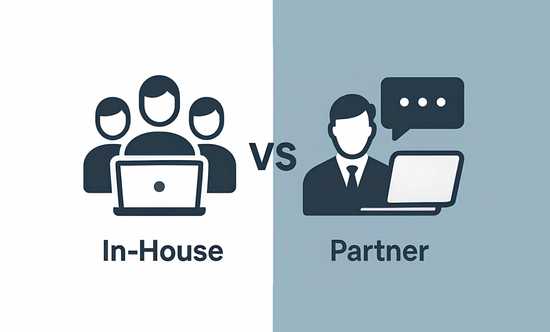Freelancer vs. Development Team: What’s the Best Choice for Building Your Product?
This is not a simple either/or — both models have strengths and trade-offs. What matters is understanding when, where, and how each approach works best.
Freelancer vs. Development Team: Key Differences in Software Project Execution
Freelancer: Flexible, Affordable, and Focused
A freelancer is an independent contractor you can hire for specific tasks or phases of development.
They’re often:
- Cost-effective in the short term
- Easy to onboard quickly
- Specialists in niche domains (e.g., UI/UX, backend, mobile)
- A great fit for prototyping or proof-of-concept work
However, hiring a freelancer also means:
- You’re managing the project yourself
- There's no built-in quality assurance or peer review
- Availability may vary based on their workload
Freelancers shine in focused, well-defined tasks where agility and speed matter more than process and scale.
Development Team: Structured, Strategic, and Scalable
These cross-functional teams follow defined workflows and long-term product thinking.
They work best when:
- Building complex, multi-layered platforms
- Working with non-technical stakeholders
- Requiring end-to-end execution from idea to market
makes product development transparent and efficient.
Product Discovery in Software Projects: Freelancer vs. Development Team Approach
Freelancers often start executing quickly, especially when given narrow specs. This can be useful for startups in validation mode.
But for anything involving user journeys, analytics, or business logic, a proper product discovery phase is critical.
Development teams are typically better equipped to:
- Facilitate workshops
- Conduct user interviews
- Build and test prototypes
Speed, Quality, and Delivery: Freelancer vs. Software Development Company
Freelancers may move quickly, especially when working on isolated tasks.
Development teams are typically better equipped to:
- Technical debt
- Lack of QA processes
- Poor documentation
A well-run development company leverages Agile, automated testing, and design systems to ensure high-quality code — even when moving fast.
Communication, Project Management, and Accountability: Freelancer vs. Development Team
Freelancers require active involvement from your side. You set goals, define tasks, follow up on progress, and manage handoffs.
This can work well if you have:
- A technical background
- Internal project management resources
- Clear specifications and tight control
But ask yourself — are you ready to take full ownership of the communication and coordination? Unlike with a structured team, all management responsibilities land on your shoulders.
Also, consider this: never outsource critical or high-risk tasks to freelancers — even if they seem small. You’re likely not their only client. And like any business, they prioritize based on value. The client paying more usually gets more attention.
Even if you're an experienced manager, accountability with freelancers can be tricky. Deadlines may slide — not necessarily out of malice, but due to shifting priorities. It's a risk you must manage.
That said, platforms like Upwork, Fiverr, and Toptal simplify freelancer sourcing and vetting, offer reviews, and sometimes include project protection features. They help — but they don’t replace long-term accountability.
Freelancer vs. Development Team: Visual Comparison of Key Factors
| Criteria | Freelancer | Development Team |
|---|---|---|
| Speed to Start | Fast onboarding | Slower, includes alignment phase |
| Management | Client-managed | Project-managed internally |
| Cost Structure | Lower hourly rates | Predictable, but higher TCO |
| Collaboration | Varies by person | Structured communication |
| Accountability | Individual-level | Shared and systemic |
| Ideal For | Short-term, tactical work | Full product lifecycle |
Security, IP Ownership, and Compliance in Outsourced Software Development
Security and IP are often overlooked when hiring freelancers. Issues can include:
- Lack of formal NDAs
- Poor data handling practices
- Disputes over code ownership
A development team usually has:
- Legal frameworks for IP transfer
- ISO or SOC-aligned processes
- Secure infrastructure for version control and deployment
If you're building something strategic or handling sensitive data, a development team is almost always the safer route.
Artificial Intelligence and Its Potential for Safeguarding Human Health
Cost and ROI Comparison: Freelancer vs. Development Team in Software Projects
Freelancers typically have lower upfront costs. But consider the hidden costs:
- Project delays
- Inconsistent quality
- High switching costs when freelancers leave mid-project
A study by PMI shows that 11.4% of investment is wasted due to poor project performance (source).
A team’s higher hourly rate can result in lower TCO (total cost of ownership) when you factor in predictability, speed, and quality.
Key Questions to Ask Before Choosing a Freelancer or Development Team
- Is the task business-critical or exploratory?
- Do I have the time and expertise to manage the process myself?
- Is long-term continuity important?
- Am I okay with potential delays or inconsistent delivery?
Being honest with these answers will help you choose the right path.
When Does Hiring a Freelancer Make Sense for Your Software Project?
Freelancers are a good fit when:
- Your project is small and well-scoped
- You need a very specific skill for a short duration
- You can manage workflows internally
Examples:
- Creating a landing page or UI animation
- Building a throwaway MVP
- Designing a mobile UI kit
When to Choose a Software Development Team for Product Scaling and Longevity
A software development team is ideal if:
- You're building a core product
- Your business depends on long-term support and feature growth
- You need guidance through multiple development stages
Partnership and Outsourcing — What Would Suit You Best?
Final Verdict: Should You Hire a Freelancer or a Software Development Team?
There’s no universal answer — and that’s important to acknowledge. Freelancers absolutely have a place in today’s development ecosystem. They are fast, flexible, and often bring deep expertise in specific areas. For small businesses or early-stage startups, this can be a game-changer.
However, they also come with limitations: higher management overhead, inconsistent availability, and risks around delivery and accountability. That’s why it's essential not to outsource critical components of your product to someone who may be juggling several clients at once.
On the other hand, development teams offer structure, strategic thinking, and long-term scalability. They are a better fit when you need a cohesive, accountable, and collaborative partner for your product's full lifecycle.
At Inventale, we’ve supported clients at every stage — from quick technical prototypes to complex AI platforms. Whatever model you choose, the key is clarity: in your goals, your scope, and your expectations.


